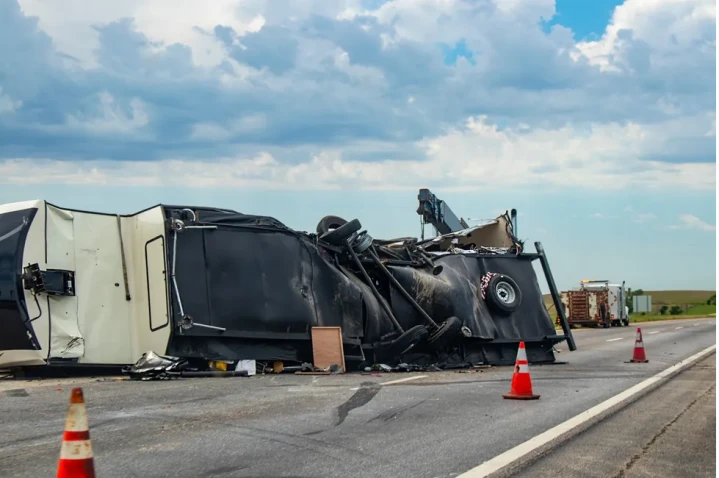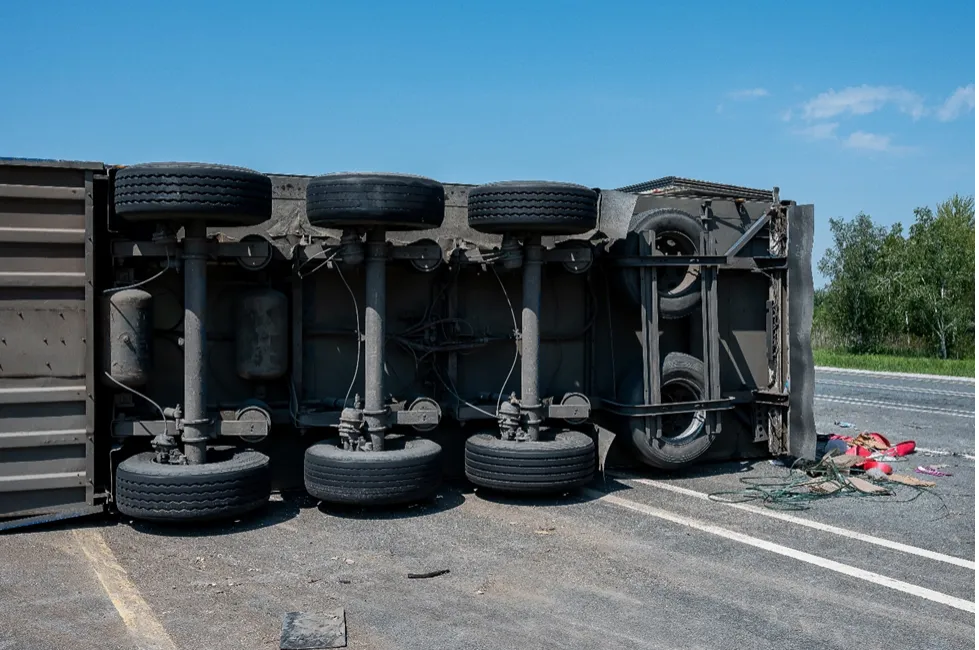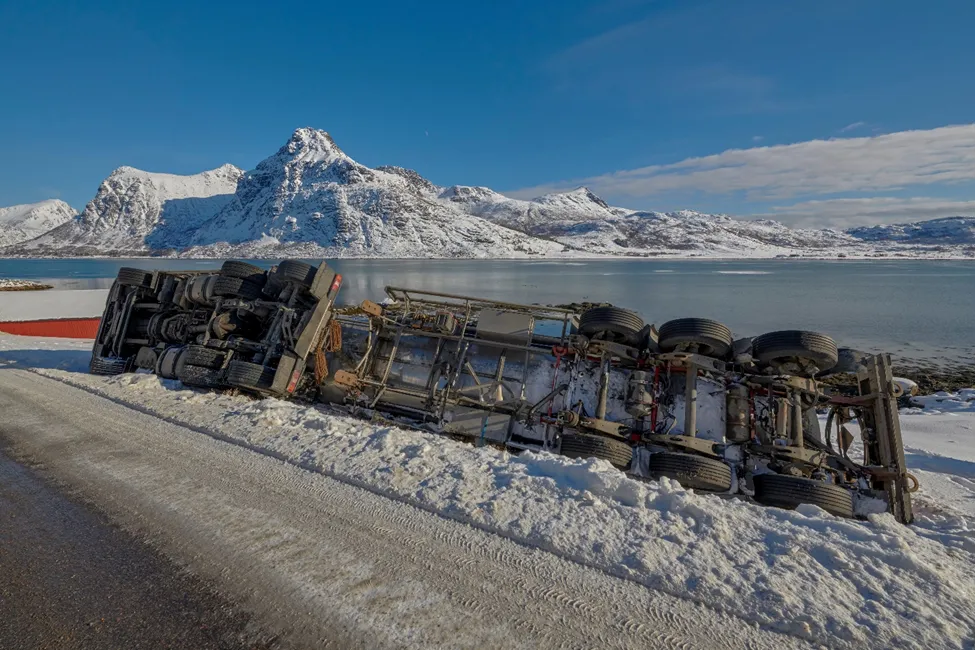DeMayo Law Offices understands the challenges of pursuing an insurance claim after a truck accident. It can cause a great deal of stress and feel like a never-ending process of completing paperwork, meeting deadlines, and locating evidence. An accident due to an oversized or overloaded commercial truck can result in significant property damage and severe injuries. You might be entitled to financial compensation. Our truck accident attorneys are here to help.
Commercial trucks are vital to our economy. Truck drivers transport goods around the country to stores, commercial properties, and consumers’ homes. Unfortunately, these large vehicles also pose a risk to other drivers and passengers on the roadways. A collision between a commercial truck and a small car can lead to devastating consequences.

The Federal Motor Carrier Safety Administration (FMCSA) regulates the trucking industry. There are specific rules for how truck drivers are supposed to load their trucks. Weight and size limits aim to prevent overloaded or oversized vehicles. Cargo securement regulations also ensure all items are correctly secured in the truck so they don’t shift during transport. Violation of these rules could cause an accident.
If you were injured in an accident with an oversized or overloaded vehicle, DeMayo Law Offices, Your North Carolina Law Firm™, could help you hold the truck driver or trucking company liable for the injuries you sustained. Call us at (877) 333-1000 for a free consultation to learn more about our legal services.
Federal Regulations for the Trucking Industry
Truck drivers have strict rules they must follow when they’re loading cargo onto their trucks. They cannot exceed weight and size limits. Maneuvering an 80,000-pound truck can be challenging, particularly when the vehicle is bigger than usual. Oversized or overloaded vehicles create hazardous conditions that may prevent the driver from having total control. Violating securement rules could also lead to cargo shifting on the trailer, throwing the entire vehicle off-balance.
FMCSA regulations for cargo are:
Securement Regulations
Any structure, part, or system for securing cargo must function correctly. Also, there should not be any defects or damage in any of those elements. Manufacturing standards are in place for specific tie-downs used to secure cargo, such as cordage, webbing, wire rope, steel, chains, or strapping.
Trucking companies should attach and secure each tie-down to prevent them from releasing, unfastening, becoming loose, or opening. Any tie-down that could come in direct contact with a piece of cargo should include edge protection, preventing cutting or abrasion of the tie-down.
The number of tie-downs for each item depends on the weight and length of the cargo:
- 1 tie-down for cargo 5 feet or less weighing up to 1,100 pounds
- 2 tie-downs for items 5 feet or less weighing over 1,100 pounds
- 2 tie-downs for items between 5 and 10 feet
- 2 tie-downs for items above 10 feet with 1 tie-down for each additional 10 feet
Performance Regulations
When a truck driver speeds up or slows down their vehicle in any direction, the cargo should not fall off the trailer or shift. Loaded items should meet these acceleration and deceleration forces:
- 0.8 g deceleration going forward
- 0.5 g acceleration going backward
- 0.5 g acceleration laterally
State Regulations for Oversized Cargo
There are no federal regulations governing oversized cargo; the states determine their own regulations. In North and South Carolina, a trucking company must apply for a permit if the cargo:
- Has an overall height greater than 13’6”
- Has a total width of over 8’6”
- Exceeds the legal weight allowed by North or South Carolina law
- Consists of a single vehicle over 40′ in length or a vehicle combination over 60′
The exception is that a truck tractor/53-foot semi-trailer combination with no overall length limitation can travel all roads.
In North and South Carolina, oversized cargo will have escort vehicles in front and behind, and they are required to display flashing lights and a banner advertising their wide load. Flags are required to be placed upon the widest portions of the load.
Applicable Vehicles and Cargo
A commercial truck is one with a tank, box, hopper, or another device making up the vehicle’s structure. Securement and loading regulations apply to these vehicles carrying any kind of cargo, except those lacking a fixed structure or shape, such as sand, liquids, and gases.
Types of Truck Accidents Caused By Oversized or Overloaded Vehicles
Items can easily shift or fall off the truck when the driver doesn’t follow federal regulations. Shifting items can cause the truck to become imbalanced, making it more difficult for drivers to maneuver or avoid crashing into another vehicle. Trailers exceeding the maximum weight and size limits can put too much pressure on the tires, causing them to explode. Not adequately adhering to federal requirements is irresponsible and could lead to severe injuries and fatalities in an accident.
The most common types of truck accidents include:
- Jackknife – A truck jackknifes when the front cab and back trailer swing towards each other at an angle. When the driver needs to maneuver or brake suddenly, an imbalanced truck could end up jackknifing.
- Lost load – Worn-out, defective, or insufficient securement systems may fail to keep cargo securely in place. Any move the driver makes could cause the load to shift and fall off the truck. This becomes a hazard for drivers around them, creating obstacles they’re forced to avoid so they don’t end up in an accident.
- Rollover – Items that slide to one side of the trailer can throw off the entire vehicle’s balance. The uneven weight distribution can result in the truck tipping onto its side if it jumps a curb or crashes into a stationary object.
- Tire blowout – Commercial trucks are heavy, with some weighing up to 80,000 pounds. Weight and size restrictions are necessary because tires can only handle a certain amount of pressure. The extra weight could cause the tires to explode, leading to a crash.
- Hazardous freight – Federal guidelines are set to ensure trucking companies store and transport toxic substances safely. Violating these guidelines could result in dangerous chemicals spilling out of their containers, causing an explosion or fire during an accident.
- Oversized load improperly flagged or escort lights not functioning – State guidelines require that an escort vehicle have flashing lights and that the widest portions of the load be flagged. If one or both of these circumstances are not met, an unsuspecting driver could be taken unaware of an encroaching oversized vehicle, and an accident can result.
DeMayo Law Offices might be able to represent you in your case if you were hurt in any of the accidents listed above or another type of truck accident. You should contact us immediately following the crash, so we can begin our investigation to determine who should be held liable for your injuries.
Determining Liability After An Overloaded or Oversized Truck Accident In North and South Carolina
Oversized and overloaded cargo accidents result from someone’s negligent actions. Negligence is the legal theory that one party failed to provide a reasonable degree of care to prevent causing injury to another person.
The fault system in North Carolina places liability on the party that causes an accident. They become financially responsible for the victim’s injuries and resulting losses, such as medical bills. Even though the truck driver was driving the overloaded or oversized vehicle, their employer could be at fault for the crash for many reasons.
Examples of trucking company negligence:
- Hiring an unlicensed or inexperienced driver
- Failing to enforce cargo securement rules
- Lack of ongoing training
- Failing to perform a thorough background check on prospective drivers
- Inadequate inspection and repairs on securement systems
- Poor supervision of cargo loading procedures
Examples of truck driver negligence:
- Using tie-downs containing defects or damage
- Failing to stop and inspect the vehicle’s weight along the driving route
- Using insufficient securement systems and devices
- Driving recklessly with an improperly loaded truck
- Loading cargo past the maximum weight and size limits
At DeMayo Law Offices, we have the experience and resources to review truck accidents to determine who should be held liable. We can collect all the necessary evidence proving the trucking company or truck driver was negligent and should provide financial compensation for your suffering. You should not be responsible for the costs you incurred.
DeMayo Law Offices Will Fight for Your Rights
You have the right to pursue a legal case against the truck driver or trucking company after an oversized or overloaded truck accident. Within the first few days of the crash, you should seek medical treatment and hire an experienced overloaded truck accident lawyer from DeMayo Law Offices, Your North Carolina Law Firm™. While you’re treating your injuries, we will focus on the legal aspects of your case.
We will begin by investigating the accident and gathering evidence, such as:
- Video surveillance footage
- Accident scene photos
- Statements from eyewitnesses
- Police reports
- Trucking company’s hiring practices
- Inspection, maintenance, and repair logs for the securement systems, parts, and devices
- Truck driver’s qualifications, experience, and driving history
- Cargo records for the date of the crash, including the truck’s weight and size
Proving negligence can be a challenge. It requires an extensive investigation of the accident and all parties involved. Insurance companies don’t always play fair. Their goal is to save money and avoid paying out claims. They will perform their own investigation to find evidence that their policyholder didn’t cause the accident so they can deny your claim. We know the tactics they use and will aggressively pursue the maximum compensation you need and deserve.
Compensation You Could Receive in an Injury Case
Losses include any expenses you incurred and any physical or emotional trauma you experienced after an accident. Accidents involving large trucks typically lead to multiple losses for the occupants of the smaller vehicle.
The losses available for compensation include:
- Medical bills
- Mental anguish
- Physical impairments
- Lost wages and lost earning capacity
- Pain and suffering
- Property damage
- Lost quality of life
You can depend on DeMayo Law Offices to seek adequate compensation from the at-fault party, so you’re not forced to pay for anything out of pocket.
Contact Us
DeMayo Law Offices has over 150 years of combined legal experience and a team of award-winning attorneys. We dedicate our time and effort to each client who hires us. You can expect personalized one-on-one attention, support, and guidance from start to finish. You will not be alone as we seek the justice and compensation you deserve.
If you sustained injuries in an accident involving an oversized or overloaded commercial truck, call DeMayo Law Offices, Your North Carolina Law Firm™, for a free consultation at (877) 333-1000 today.




